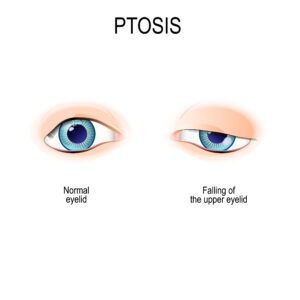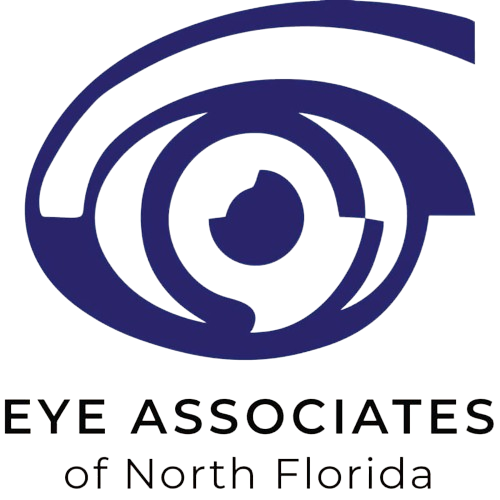What is Ptosis?

Do you have droopy or saggy eyelids that make you look tired or older than you are? Do they make it harder to see?
If so, these may be signs of a condition called ptosis. When you have ptosis, it causes the eyelid to sag. This may be only slightly or enough to partially or fully cover the pupil.
Ptosis is not the same as having extra skin, fat, or muscle in the eyelid area. These are issues you can address by undergoing a procedure called cosmetic blepharoplasty.
Ptosis can develop in both children and adults for various reasons and affect your ability to see clearly. The good news is that if you have ptosis, there is treatment available that can restore your vision and improve your visual appearance. Keep reading to learn more about ptosis and how you can treat it!
What are the Symptoms of Ptosis?

The degree of ptosis varies by patient, with symptoms ranging in severity. When the skin sags or droops low enough, your field of vision can be partially or fully obstructed.
Sometimes it only affects one eyelid (unilateral ptosis), and it can also affect both, known as bilateral ptosis. You may tip your head back slightly or raise your eyebrows to see better because of how much your eyelids droop.
You may also notice you have a tired look all the time or that you have overly dry or wet eyes. Your eyes may cross as well, as the nerve that moves your eye is in charge of alignment, tracking, and focus.
Some patients experience aching in the area surrounding the eyes and the forehead. The aching will occur as other muscles attempt to compensate.
Ptosis can make it difficult to perform daily activities like reading, watching TV, and driving. These activities can become more difficult because having ptosis can compromise your field of vision.
Patients may have reduced peripheral vision or consistent fatigue that affects their quality of life.
What are the Causes of Ptosis?

While you can be born with ptosis, it most commonly develops with age. As you get older, the muscles surrounding your eyes weaken, causing the skin to droop.
Specifically, the attachment between the levator muscle (which lifts the eyelid) and the tarsus near the eyelid margin can be diminished. With age, the elasticity of the connective tissue is reduced over time and becomes less effective.
Besides aging, you can also develop ptosis due to eye trauma. Undergoing damage to the nerves that control the eyelid muscles can lead to ptosis.
Excessive eye rubbing and using rigid contact lenses can affect the eyelid, as can the muscular stretching that occurs during cataract surgery or LASIK.

In rare cases, developing ptosis is a sign of a disease, like diabetes or Horner syndrome. It can also indicate a grave underlying medical condition, like having a stroke. For this reason, it’s best to contact your eye doctor right away to schedule an appointment if you notice your eyelids drooping and they haven’t before.
How is Ptosis Diagnosed?
Your eye doctor will conduct a complete physical examination of your eyes and ask about your medical history. They will inquire about any symptoms you may be experiencing and the length of time they’ve been occurring.
They will then test the strength of the muscles in your eyelid to determine any existing weakness. They may choose to run imaging tests, which can include undergoing an MRI, to assess the status of the nerves,
How is Ptosis Treated?
If you have ptosis, it may not mean that you need to have surgery. If it is not affecting your vision, your ophthalmologist may not recommend treatment at all. Some patients choose to undergo ptosis surgery for purely cosmetic reasons if they have a less severe case of ptosis.
Ptosis surgery is an outpatient procedure that tightens the levator muscle. This muscle is responsible for lifting the lid.
The exact nature of the procedure depends on your specific needs. Your oculoplastic surgeon at Eye Associates of Tallahassee will conduct an in-depth consultation to determine your needs. They will then discuss the best treatment options for you.
In cases where ptosis reduces peripheral vision, surgical correction may be covered by insurance. If your ptosis doesn’t significantly impede your field of vision, it may be only considered a cosmetic procedure.
For patients who can’t undergo surgery or have temporary ptosis, special glasses are available called a ptosis crutch. These glasses hold up the sagging skin of the eyelid and are a non-invasive way to treat ptosis.
Ptosis in Children
Typically, ptosis occurs in children when the levator muscle does not fully develop. Called congenital ptosis when present at birth, this may be a genetic outcome.
Ptosis in children has signs like a drooping eyelid, or the upper eyelid creases don’t line up evenly with each other, looking crooked. A child with ptosis may raise their eyebrows, lift their chin, or tip their head back as a way to see better.
Children with ptosis should get regular check-ups with their eye doctor to monitor the status of their condition and their vision. Most children with ptosis will need surgery to treat it by tightening the levator muscle or attaching the eyelid to other muscles to help lift it.
Ptosis in children can lead to the development of amblyopia, also known as a lazy eye. Having a lazy eye has the potential to limit a child’s ability to see.
To avoid permanent effects, your child will need treatment for amblyopia if they have it. Treatment for amblyopia usually consists of wearing an eye patch, special glasses, or using eye drops that help strengthen your child’s weaker eye.
If you have ptosis or are frustrated by drooping eyelids, help is out there. Schedule an appointment with Eye Associates of Tallahassee in Tallahassee, FL, today!







